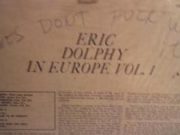
Sean from Tokyo Jazz Notes was kind enough to do a Q&A with me over at his site. I’m happy to return the favor here!
1. Tell us something about how you got to Tokyo, got into the local scene and why you started Tokyo Jazz Notes:
Well, I first came to Japan in 1997, initially working in Hiroshima and then moved to Tokyo five years ago. I’ve always been a keen music fan and through sampling different types of club nights over the years, I found myself being more and more drawn to the Japanese club jazz scene.
Tokyo Jazz Notes came about simply because I realized that there was very little information about the scene in Japan available in English, and there were music lovers in other parts of the world keen to find out about what was going on here. Since nobody else was providing a steady flow of information in English about this scene I thought why not give it a go? The Soul Sauce moniker is in part a tribute to the classic sixties Cal Tjader tune and also reference to the fact that Tokyo Jazz Notes was the only place to get the lowdown on what was happening here in Japan in English.
2. Your site is full of recent album reviews and live gig information. What sites or magazines do you check to find out what’s being released and about upcoming gigs? (And how to you manage to get to so many live shows?!)
Basically, I get most of my information by trawling artist and venue websites. Starting from a basic core of artists that I knew, I then started looking out for other artists who appeared on the same billing at gigs. I also checked out word-of-mouth recommendations from people I bumped into when out and about. As time has passed, I’ve managed to establish contact with some of the artists I’ve reviewed and I occasionally get information directly from the artists themselves.
I try to get to as many gigs as my timetable and wallet will allow. I’m pretty much hooked now and get severe withdrawal symptoms if I go more than a month without a gig!
3. I tend to be very old school with my listening habits and bar hopping in Tokyo. Dingy cafes and bars with dusty records from the 50s up on the shelf. But your site has introduced me to the very vibrant contemporary jazz (and “jazzy) scene in Tokyo. Is the current scene an outgrowth of the classic 1960s Tokyo jazz era, or is it something completely new?
Essentially the contemporary scene has grown out of the club and DJ scene rather than the classic jazz club era, so it’s something new. The jazz dance and acid jazz scenes in the UK were mirrored by similar scenes here in Japan, but rather than being a mere imitation of a scene from elsewhere, the Japanese scene has developed with its own distinct flavour and identity.
Over the years the borderlines between club jazz events and jazz club concerts has become blurred with club jazz artists and DJs now playing at jazz clubs as well as larger venues, whilst at the same time still remembering their club roots. Some of the musicians have one foot in each scene, mixing work on contemporary club sounds with sessions in jazz clubs where they get to play some standards.
Personally, I love dipping into both the contemporary club scene and also the longer established jazz clubs and bars as well. Simply put, I look out for any chance to get out and listen to some great music.
4. For someone new to Tokyo what clubs & bars would you bring them to for a good sampling of the scene?
If you could only visit one place, it would have to be The Room in Shibuya which is really at the centre of a lot of what is happening. The club has a variety of regular events centred around different genres with some live sessions as well, and many DJs around the globe list it as being one of the best small clubs in the world.
From there it’s a short walk to JZ’Brat, which regularly plays host to gigs from some of the cream of the new generation of artists. Some nights will be sit-down affairs, but on other nights the tables are taken out to make it an all-standing venue. I could go on, but generally speaking I enjoy smaller live venues or clubs, and there are plenty of places to try out.
5. Give us your all-time top 5 musical gods, any and all genres!
Wow! The shortest question, but by far the most difficult to answer! I had to really think about this and for now have narrowed it down to the following (in no particular order):
Fela Kuti
Fela’s Afrobeat is timeless, mesmerizing music and the fact that there are so many bands around the world making their own brand of neo-Afrobeat now is testament to his genius. He was also a larger than life character with a no nonsense, no compromise attitude.
Marvin Gaye
He simply had an amazing voice and in addition to his versions of some of Hit Factory classics of the sixties, he was also the creator of some absolute masterpieces such as What’s Going On? and Here, My Dear.
Miles Davis
Few people have managed to reinvent themselves and continue to be at the forefront of their scene as successfully as Miles. I particularly like his second great quintet in the sixties.
Art Blakey
Hard bop master and maybe the bandleader who launched more careers than any other musician in the modern jazz era. What’s not to like?
Erykah Badu
In an era when so many mainstream artists are like corporate clones, Badu is refreshingly original and not afraid of trying something different.
[I’ve asked this kind of question to other people, but it’s only when I try to answer myself that I realize how difficult it is, especially if you have a big music collection. Could also easily have included McCoy Tyner, Wayne Shorter, Gregory Isaacs or Nick Drake! The list goes on … ]
Many thanks to Sean for his time and his great website. We hope to catch up with him soon for some live music around town!













